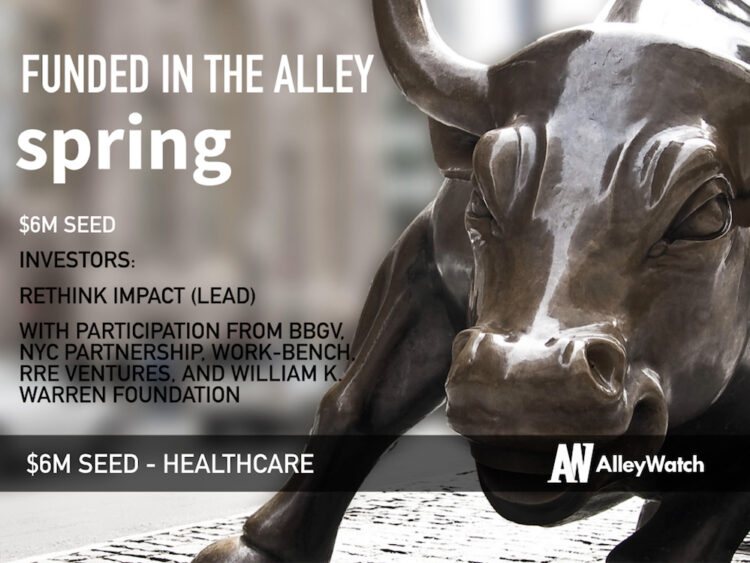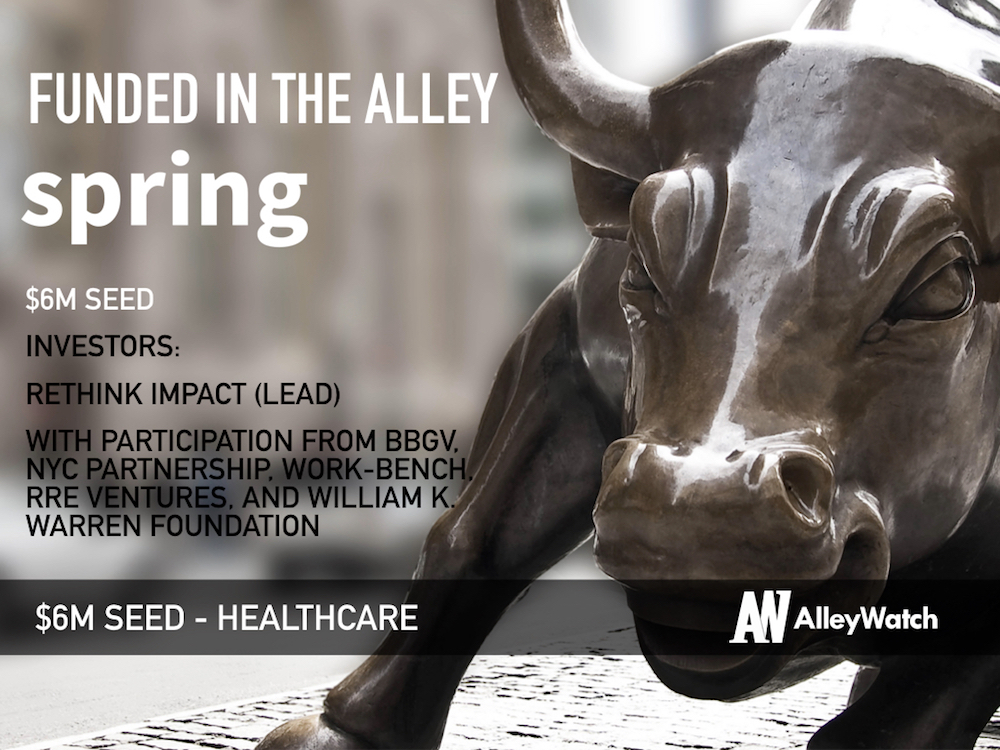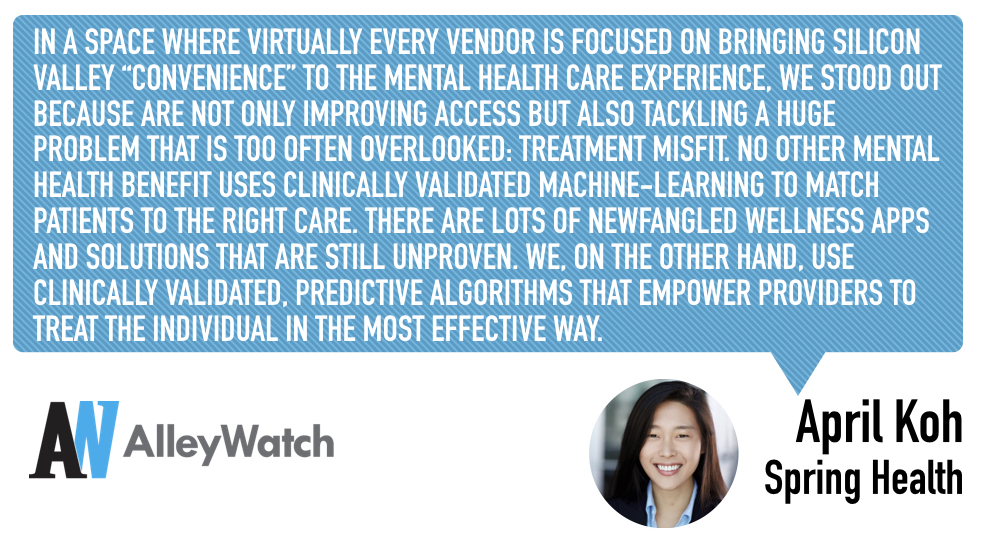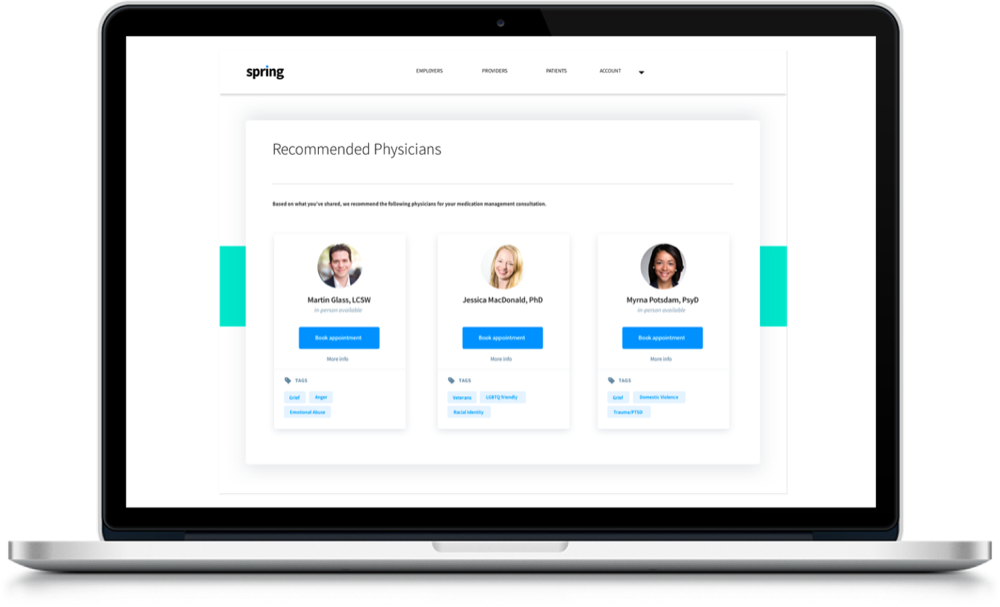Mental health is extraordinarily important, but it’s often been still too taboo to openly discuss in the workplace…until now. Spring Health is the NYC startup that offers digital mental health services to employers giving employees free access. Users are matched to a professional and personalized treatment plan via AI and mental healthcare experts. The company’s platform ensures that people have access to the right help early on in their journey.
AlleyWatch sat down with CEO and Founder April Koh to learn more about the two-year-old startup that has raised a total of $8M in funding over two rounds. April candidly discusses the funding process and what it is like to build a startup in NYC
Who were your investors and how much did you raise?
We are announcing the close of a $6M seed round, which brings our total funding to date to $8M. The round was led by Rethink Impact and we had additional strategic investments by female investors at BBG Ventures, The Partnership Fund for New York City, and Work-Bench — an all-female syndicate of new investors. Existing investors RRE Ventures and William K. Warren Foundation also contributed to the round.
Tell us about what service Spring Health provides.
At Spring Health, we offer digital mental health services to employers, which gives employees access to free mental health care. Users are matched to a professional and personalized treatment plan, using proprietary clinically-validated artificial intelligence and personal care navigators. Plans range from personalized wellness recommendations, including specific treatment options, to suggested exercise regimens and self-help resources. Our goal is to get treatment right from the very beginning and match people with a compatible, highly-qualified provider via video or in-person.
 What inspired you to start Spring Health?
What inspired you to start Spring Health?
I watched my best friend cycle through seven different antidepressants and multiple providers to find care that worked for her. At Yale, I sought out Dr. Adam Chekroud, a global expert on AI applications in psychiatry, and together with my good friend Abhishek Chandra, we built the first prototype to Spring Health in a few days and showed it to everyone. When enough people thought we were onto something, we jumped in, raised our pre-seed, and moved to New York.
How is Spring Health different than other personal health services?
Clinical validation and evidence. We have over a dozen published papers in top medical journals describing the accuracy of our machine-learning models. Unlike any other option on the market, we have clinical evidence demonstrating that our solution can work even better than conventional care. We have been committed to clinical evidence from day one because we strongly believe that patients deserve no less. I am sometimes astonished by the number of programs that purport to solve mental health issues without any clinical evidence to back up those claims. All of our research is focused on how to get people back to emotional well-being as quickly as possible, so they can thrive socially and professionally.
What market are you targeting and how big is it?
One in four employees struggle with mental health issues, and employees, especially the younger generation, are becoming much more outspoken about the critical need for better mental health resources in the workplace. More and more, we see employers making better mental health support for employees a priority in benefits packages. The market is growing, and the best part is that we service companies in all industries. Though larger companies with upwards of 5,000 FTE’s have a greater financial incentive to adopt innovative behavioral health solutions for employees because they are self-insured, companies of all sizes are interested in Spring’s services.
What’s your business model?
We offer B2B solutions to employers. The pricing model follows the standard structure of benefits pricing: we charge per employee per month, with an added fee for dependents.
Why is AI well suited for application in the mental health which tends to be very personal?
People might associate AI with dehumanization and coldness. I think the opposite — our algorithms help our practitioners focus their conversations with patients, spend their visits more productively, and focus on what they do best. Keep in mind, we are personalized by AI, and made personal by humans: we don’t remove humans from the equation, but rather we use AI to empower them to make the most successful decisions for their patients.
What was the funding process like?
We had strong interest from investors because of Spring’s big vision: a future in which mental health practitioners don’t make guesses anymore, but instead rely on data and algorithms to make highly successful decisions for their patients. In a space where virtually every vendor is focused on bringing Silicon Valley “convenience” to the mental health care experience, we stood out because are not only improving access but also tackling a huge problem that is too often overlooked: treatment misfit. No other mental health benefit uses clinically validated machine-learning to match patients to the right care. There are lots of newfangled wellness apps and solutions that are still unproven. We, on the other hand, use clinically validated, predictive algorithms that empower providers to treat the individual in the most effective way.
What are the biggest challenges that you faced while raising capital?
Finding investors that I felt chemistry with. All of our new investors are all female, and that’s not a coincidence. I started fundraising when #MeToo was just dying down and #AllRaise was in full gear. I made it a priority to seek out female VC’s who were aligned with me in my vision to grow a safe and diverse workplace.
What factors about your business led your investors to write the check?
I think it boils down to an excellent team with a clear unfair advantage in computational psychiatry. My genius cofounder Dr. Adam Chekroud has several degrees from Oxford and a PhD from Yale in computational methods to improve the practice of psychiatry and is arguably a global expert on the subject. His expertise, combined with my experience building products and Abhishek’s brilliant technical mind, made for a really strong team. Another big factor was the strength of our IP. We have some of the most sophisticated precision medicine algorithms in the space and are continually producing papers describing our research in the space.
What are the milestones you plan to achieve in the next six months?
Our top priority is to expand our reach and impact employees all over the nation, with a specific focus on enterprise customers. We’ll be hiring an amazing team to help us design and build mental health care 2.0. We’ll be obsessing over patient experience and continuing to prove out our value to employers through more expansive and robust case studies.
What advice can you offer companies in New York that do not have a fresh injection of capital in the bank?
My biggest advice is to decide what you’re going to do and just go do it. Don’t stall, don’t be wishy-washy about bootstrapping or raising money. Pick one and focus only on that until you have the money you need. Also, go out for beers with your cofounders more.
Where do you see the company going now over the near term?
Becoming the leading mental wellness benefit for mid-large companies.
What’s your favorite restaurant in the city?
I love Upland’s pancakes for brunch! And I have a soft spot for the Brooklyn Barge in Greenpoint because it’s local and the sunsets are epic.






